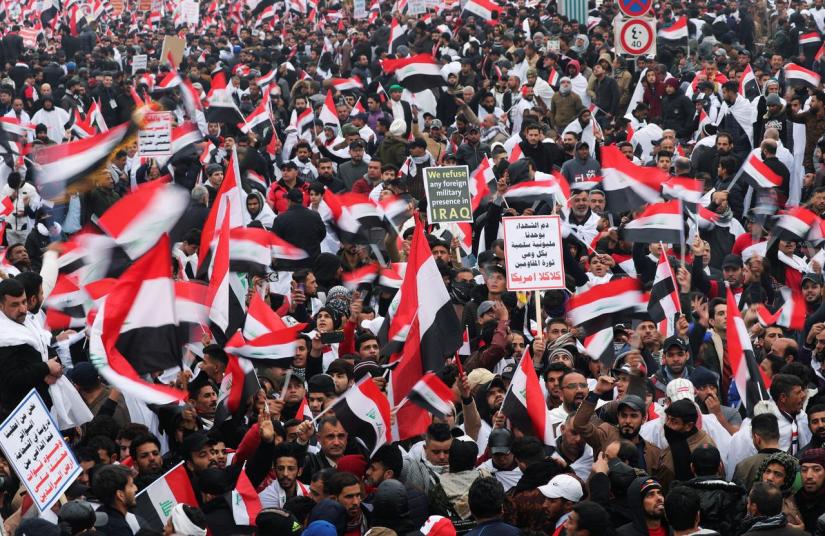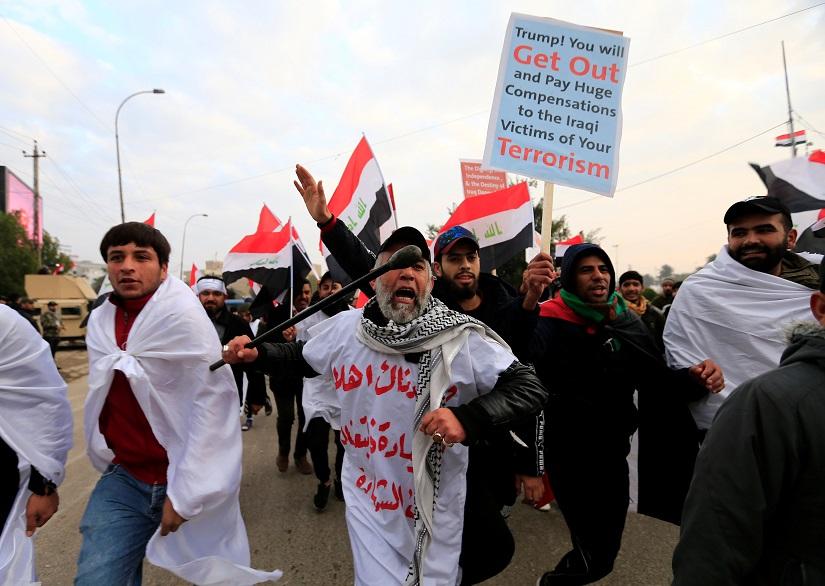 Thousands of Iraqis rallied at two central Baghdad intersections on Friday after a prominent cleric called for a "million strong" protest against the American military presence, following the US killing of an Iranian general and an Iraqi militia chief.
Thousands of Iraqis rallied at two central Baghdad intersections on Friday after a prominent cleric called for a "million strong" protest against the American military presence, following the US killing of an Iranian general and an Iraqi militia chief.
The initial march appeared not to gather further steam, however, largely dissipating after several hours. Some protesters headed to join separate anti-government demonstrators at Baghdad's Tahrir Square, and others boarded buses to go home.
The march called by Moqtada al-Sadr aimed to press for a pullout of US troops. Many anti-government protesters feared it could overshadow their separate, months-long demonstrations that have challenged Iran-backed Shi'ite groups' grip on power.
Iraq's top Shi'ite Muslim cleric, Grand Ayatollah Ali al-Sistani, later called in his weekly sermon for political groups to form a new government as soon as possible to bring stability to the country and enact reforms to improve Iraqis' lives.
Sadr, who commands a following of millions in vast Baghdad slums, opposes all foreign interference in Iraq but has recently aligned himself more closely with Iran, whose allies have dominated state institutions since a 2003 US-led invasion.
Sadr supported anti-government protests when they began in October, but did not publicly urge his followers to join them.
The demonstrations have since taken aim at all groups and figures that are part of the post-2003 system including Sadr, who although often considered an outsider is part of that system, commanding one of the two largest blocs in parliament.
Some lawmakers and protesters say the new, anti-US element to public unrest distracts from the aim of toppling the corrupt political elite and could fuel more violence.
 Throngs of marchers started gathering early on Friday at al-Hurriya Square in central Baghdad and near around the city's main university, Reuters witnesses said. Marchers avoided Tahrir square, symbol of mass protests against Iraq' ruling elites.
Throngs of marchers started gathering early on Friday at al-Hurriya Square in central Baghdad and near around the city's main university, Reuters witnesses said. Marchers avoided Tahrir square, symbol of mass protests against Iraq' ruling elites.
"We want them all out - America, Israel, and the corrupt politicians in government," said Raed Abu Zahra, a health ministry worker from southern city of Samawa, who arrived by bus at night and stayed in Sadr City, a sprawling district of Baghdad controlled by the cleric's followers.
"We support the protests in Tahrir as well, but understand why Sadr held this protest here so it doesn't take attention from theirs," he added.
Men and women marched waving the red, white and black national colours, and chanted slogans against the United States, which leads a military coalition against the Islamic State militants in Iraq and Syria.
"Do not cross this barrier"
Some were wearing symbolic white robes indicating they're willing to die for their country while others sat looking out over the square from half finished buildings, holding signs reading "No, no, America, no, no, Israel, no, no, colonialists".
Marchers were protected by Sadr's Saraya al-Salam brigades and Iraq's Popular Mobilization Forces, an umbrella grouping of Iran-backed Shi'ite militias, witnesses said.
The march looked unlikely as initially feared to end up at the gates of the US Embassy, the seat of US power in Iraq and the scene of violent clashes last month when militia supporters tried to storm the compound.
Sistani, who condemned the killing of Iranian military mastermind General Qassem Soleimani in a US drone strike on Jan 3, repeated his opposition to foreign interference in Iraq.
"Iraq's sovereignty must be respected ... and citizens should have the right to peaceful protest," he said.
Sistani, who comments on politics only in times of crisis and wields great influence over Iraq's Shi'ite majority, urged reform and a new government as soon as possible.
Under the government of caretaker Prime Minister Adel Abdul Mahdi, who said he would quit in November, security forces and unidentified gunmen believed to be linked to powerful Iran-backed militias killed nearly 450 anti-establishment protesters.
Main roads in Baghdad were barricaded on Friday by security forces and the city's Green Zone, which houses foreign missions, were blocked off with concrete barriers. Outside the US embassy, a sign read "Warning. Do not cross this barrier, we will use pre-emptive measures against any attempt to cross".
The killing of Soleimani has raised the spectre of more civil strife in a country torn by years of sectarian conflict.
For the first time in nearly two years, parliament voted along sectarian lines to press the government to kick out US forces. Shi'ite parties voted in favour, while Sunni Muslim and Kurdish lawmakers boycotted the session.


